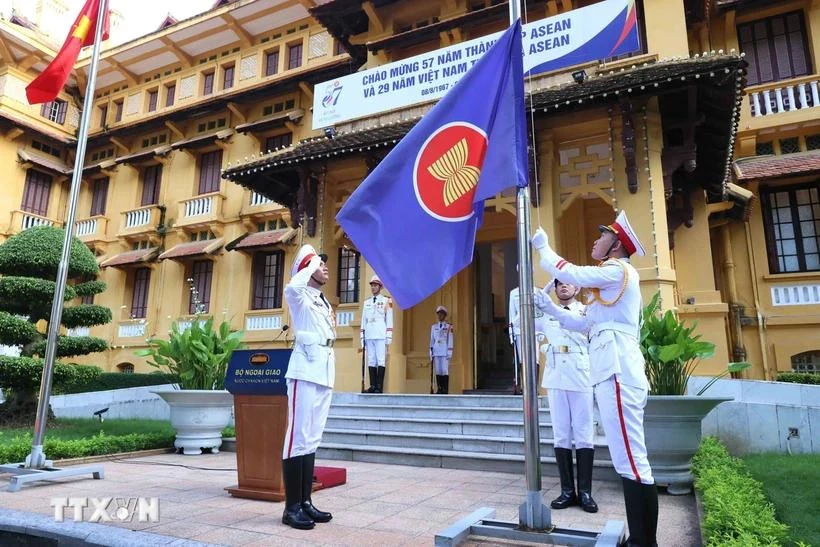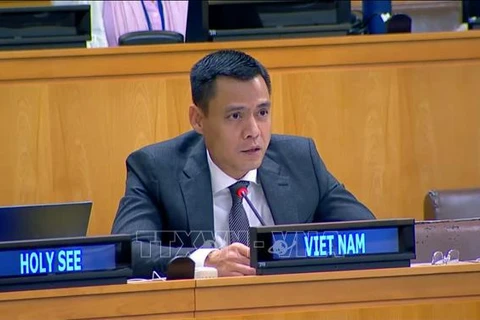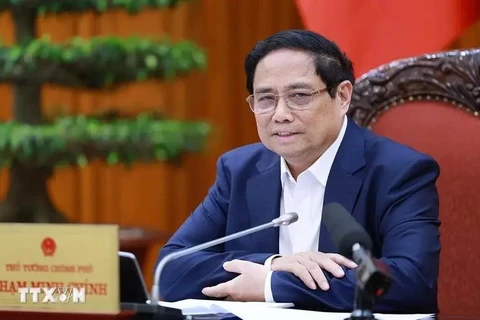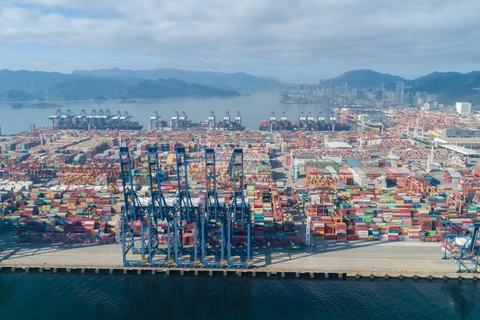
Hanoi (VNA) – Prime Minister Pham Minh Chinh will lead a high-ranking delegation to the 44th and 45th ASEAN Summits and related meeting in Vientiane, Laos, from October 8-11, continuing to affirm Vietnam’s active, proactive and responsible contributions to regional cooperation processes.
During the 29-year ASEAN membership, Vietnam has rapidly integrated and participated deeply in all areas of ASEAN cooperation and made positive contributions to maintaining intra-bloc solidarity, strengthening cooperation among the member countries as well as between ASEAN and external partners, and contributing significantly to the development and success of the bloc.
It performed the role of ASEAN Chair three times in 1998, 2010, and 2020. During its 2020 ASEAN Chairmanship, in a context unseen before, Vietnam promoted the ASEAN Community’s unity and effective and prompt response to the unprecedented challenges of the COVID-19 pandemic, maintaining ASEAN’s solidarity and connectivity, supporting people's stable lives, and promoting recovery efforts. Initiatives proposed by Vietnam in this context, including the online meeting format, have continued to be applied by other member countries, contributing to enhancing ASEAN's adaptability and self-reliance, as well as accelerating the region's post-pandemic recovery.
In addition to actively fulfilling its role as rotating ASEAN Chair, Vietnam has also made important contributions to decisions to guide ASEAN's development. At the 43rd ASEAN Summit in September 2023, it proposed the initiative to hold the ASEAN Future Forum to support official forums and mechanisms of the association, creating opportunities for broad a exchange of ideas and initiatives on regional cooperation, contributing to building a resilient and sustainable ASEAN Community. The forum was first held in Hanoi in April 2024, drawing nearly 400 delegates.
Vietnam has assumed the role of coordinator for relations between ASEAN and partners, contributing to promoting substantive and effective cooperation between the grouping and many important partners such as China, the US, Russia, Japan, and the Republic of Korea, and is preparing to take over the role of the coordinator for two partners - New Zealand and the UK - after July 2024 for a three-year term.
It is always among the top countries in terms of the rate of implementing commitments on economic integration in the ASEAN region. Vietnam initiated the idea of forming an ASEAN Socio-Cultural Community, paying greater attention to building a harmonious, cohesive, distinctive, and people-centred ASEAN Community. Its commitment to ASEAN is consistent and continuous.
According to Deputy Foreign Minister Do Hung Viet, head of the ASEAN Senior Officials' Meeting (SOM) delegation of Vietnam, being ready to contribute and make every effort for the common success, the participation by the Vietnamese delegation led by PM Chinh in the 44th and 45th ASEAN Summits and related meetings in Vientiane this time aims to send out many important messages about ASEAN and the future of the grouping.
The messages include the ASEAN cooperation orientations, ASEAN future shaping, and ASEAN’s role positioning, he said.
Vietnam’s participation continues strongly sending out a message of a Vietnam with active, proactive, and responsible contributions together with other ASEAN members to maintain and strengthen the central role and promote the responsible voice of the grouping for peace, stability, and development.
As scheduled, the 44th and 45th ASEAN Summits and related meetings will have about 20 activities with the participation of leaders of ASEAN countries and partners, along with many guests who are representatives of international and regional organisations.
This is the most important summit chain of an ASEAN Year, creating an opportunity for leaders of ASEAN countries and partners to meet and make strategic decisions to consolidate the process of building the ASEAN Community, promoting relations between ASEAN and partners, and to discuss regional and international issues of concern.
About 80 documents are expected to be approved or recorded by the leaders at these summits.
Established on August 8, 1967, the Association of Southeast Asian Nations (ASEAN) now comprises of 10 countries - Vietnam, Indonesia, Thailand, Philippines, Singapore, Malaysia, Brunei, Laos, Myanmar, and Cambodia. Timor-Leste is on track to become a full member of the grouping.
The founding of the association reflected the common aspirations of many regional countries for peace, stability, friendship, and cooperation for their common development. Despite differences in religion, development level, infrastructure, and information technology, the countries have always supported, helped, and developed together in all aspects.
The association has become a dynamic and influential regional organisation with successes in economic integration, cultural exchange, and political cooperation among the member countries.
From an initial population of about 260 million, ASEAN is now home to more than 650 million people, a potential market.
The most important success of ASEAN over the past 57 years has been ensuring the maintenance of peace and stability in the Southeast Asian region, with member countries building increasingly good cooperative relationships. Differences among members, disagreements or disputes have been all prevented and resolved on the basis of common interests.
ASEAN has expressed its steadfast stance in maintaining peace and stability in the East Sea and the region through the 2002 Declaration on the Conduct of Parties in the East Sea (DOC) and negotiations on a Code of Conduct in the East Sea (COC) which are expected to be completed soon, along with many other important developments.
With a network of eight free trade agreements (FTAs) including the ASEAN Free Trade Area (AFTA) and seven FTAs with important partners, including the Regional Comprehensive Economic Partnership (RCEP), the grouping has become a free trade area accounting for 30% of the world's population and 32% of the global gross domestic product (GDP).
The ASEAN Community has been operated for nine years and is on the journey to realise the Vision 2025 and develop an ASEAN Community’s Post-2025 Vision across all the three pillars of politics-security, economy, and socio-culture.
Towards a sustainable development future, members of the grouping have built the ASEAN Community Vision 2045 following the "self-reliant, dynamic, innovative, and people-centred" direction.
Over the past 57 years, ASEAN has also established close cooperative relations with many important countries and organisations in the world, including all major countries. To date, 94 partners have sent their ambassadors to ASEAN, and 55 ASEAN Committees in Third Countries and International Organisations (ACTCs) been established. ASEAN currently has 11 dialogue partners - China, Japan, the Republic of Korea, India, Australia, New Zealand, Russia, the US, Canada, the European Union (EU), and the UK, along with four sectoral dialogue partners and four development partners./.






















